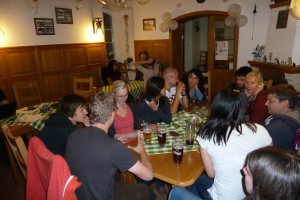Chris Balakrishnan and me are organizing a symposium on “Evolution of behavior: Comparative genomics and transcriptomics” for the SMBE meeting this year.
We invited three excellent speakers: David Clayton, Todd Preuss, and Suzy Renn
The Meeting will take place in Chicago from July 7th to 11th. Online registration will start on January 25th 2013. You are welcome to submit an abstract to the topic of our symposium:
Behavior is a complex phenotype determined by many genes. Behavior is also a plastic phenotype that individuals adjust according to environmental or physiological conditions. A systems biology perspective is therefore appropriate and necessary to study the evolution of behavior. This includes especially the comparative study of multiple genes, their expression and interactions involved in controlling behavior. With genomic and transcriptomic data from relevant study species now readily available and/or attainable, it is timely to bring specialists working on different taxa together to discuss general and taxa specific trends in our understanding of the evolution of behavior. Topics to discuss in this symposium will range from how to bridge the gap from changes in molecular signatures to changes in phenotype, evolution of social behavior, and individual variation in behavior. This symposium will stimulate fresh discussions among ecologists, neuroscientists, molecular and computational biologists to enhance our understanding of the evolution of behavior.


